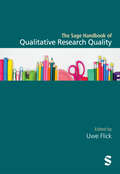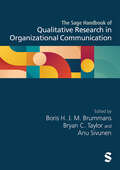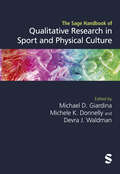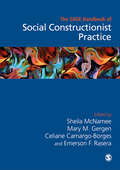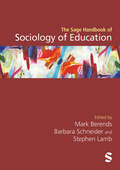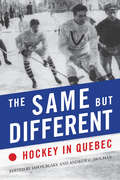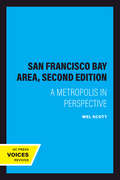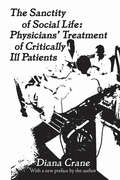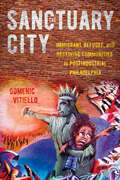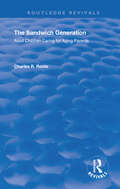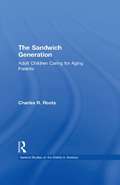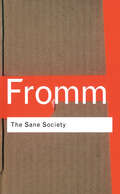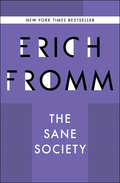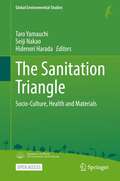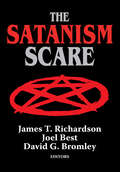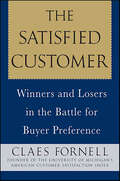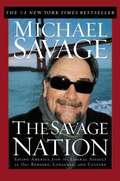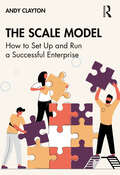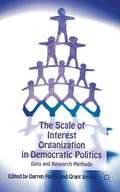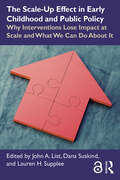- Table View
- List View
The Sage Handbook of Qualitative Research Quality
by Uwe FlickThis Sage Handbook presents an interdisciplinary collection of chapters exploring how to assess the quality of collecting and analysing qualitative data, while maintaining a focus on diversity, digital and critical approaches. The Handbook considers essential questions such as what is good qualitative research? What makes qualitative research good research? And, how can we make qualitative research better research? Contributions come from a wide array of experts, and highlight answers to questions from various disciplinary and geographical areas; from mixed methods to multimodal and online research, from specific types of data and methods to specific target groups, and from theoretical and epistemological contexts to those where funding has an impact on how research is done and assessed. Qualitative research has evolved in many respects in recent decades and has grown increasingly multidisciplinary. Research in general is facing new challenges around how to take diversity and decolonisation into account in what researchers do, as well as how to produce and communicate qualitative research quality. This Handbook offers a timely overview of such developments, and will support researchers involved in planning, designing, doing and evaluating qualitative research in developing an increased sensitivity for contemporary debates and challenges in the field. Part I Philosophies and Epistemologies of Qualitative Research Quality Part II Disciplinary Discourses of Qualitative Research Quality Part III Qualitative Research Quality for Specific Approaches Part IV Rethinking Qualitative Research Quality for Specific Methods and Data Part V Rethinking Strategies for Quality in Qualitative Research Part VI Rethinking Criteria for Quality in Qualitative Research Part VII Extending Contexts and Challenges for Qualitative Research Quality
The Sage Handbook of Qualitative Research in Organizational Communication
by Bryan C. Taylor Boris H. J. M. Brummans Anu SivunenThe Sage Handbook of Qualitative Research in Organizational Communication is a state-of-the-art resource for scholars, students, and practitioners seeking to deepen their understanding and expertise in this dynamic field. Written by a global team of established and emerging experts, this Handbook provides a comprehensive exploration of the field’s foundational traditions of epistemology and theory, as well as its latest methodologies, methods, issues, and debates. The volume reflects a diverse range of approaches (e.g., mixed-methods, ethnographic, rhetorical, pragmatist, phenomenological, feminist, critical race, postcolonial, queer, and engaged), and covers a broad spectrum of topics ranging from data collection and analysis, to representation. Additionally, this Handbook addresses emerging trends such as digital forensics, post-qualitative research, and the transformative impact of COVID-19 on the conduct of qualitative research in organizational communication. As the first volume of its kind in this field, The Sage Handbook of Qualitative Research in Organizational Communication is a cornerstone text for scholars, students, and practitioners interested in understanding the vital role of communication in organizational life. Part 1: Approaches to Qualitative Organizational Communication Research Part 2: Data Collection in Qualitative Organizational Communication Research: Methods and Issues Part 3: Data Analysis and Representation in Qualitative Organizational Communication Research: Methods and Issues Part 4: The Future of Qualitative Organizational Communication Research
The Sage Handbook of Qualitative Research in Organizational Communication
by Bryan C. Taylor Boris H. J. M. Brummans Anu SivunenThe Sage Handbook of Qualitative Research in Organizational Communication is a state-of-the-art resource for scholars, students, and practitioners seeking to deepen their understanding and expertise in this dynamic field. Written by a global team of established and emerging experts, this Handbook provides a comprehensive exploration of the field’s foundational traditions of epistemology and theory, as well as its latest methodologies, methods, issues, and debates. The volume reflects a diverse range of approaches (e.g., mixed-methods, ethnographic, rhetorical, pragmatist, phenomenological, feminist, critical race, postcolonial, queer, and engaged), and covers a broad spectrum of topics ranging from data collection and analysis, to representation. Additionally, this Handbook addresses emerging trends such as digital forensics, post-qualitative research, and the transformative impact of COVID-19 on the conduct of qualitative research in organizational communication. As the first volume of its kind in this field, The Sage Handbook of Qualitative Research in Organizational Communication is a cornerstone text for scholars, students, and practitioners interested in understanding the vital role of communication in organizational life. Part 1: Approaches to Qualitative Organizational Communication Research Part 2: Data Collection in Qualitative Organizational Communication Research: Methods and Issues Part 3: Data Analysis and Representation in Qualitative Organizational Communication Research: Methods and Issues Part 4: The Future of Qualitative Organizational Communication Research
The Sage Handbook of Qualitative Research in Sport and Physical Culture
by Michael D. Giardina Michele K. Donnelly Devra J. WaldmanThe Sage Handbook of Qualitative Research in Sport & Physical Culture is a pivotal resource that marks the next evolutionary step in the field of qualitative research within sport and physical culture. Building on decades of methodological advancements and scholarly contributions, this handbook addresses the dynamic and expanding nature of the field. It brings together a diverse group of contributors from over a dozen countries, including Argentina, Australia, Canada, China, France, Japan, Netherlands, Norway, Poland, Qatar, Spain, the United States, and the United Kingdom, showcasing the international growth and vibrancy of qualitative research in this domain. Contributors come from a wide array of disciplinary backgrounds, such as anthropology, education, health sciences, human movement and nutrition sciences, journalism and communication, kinesiology, public health, sociology, sport and exercise psychology, sport management, and women’s, gender, and sexuality studies. They explore a range of traditional and emerging topics and methodologies, from feminist inquiry and Indigenous methodologies to new materialism and political ecologies, from interviewing and ethnography to arts-based methods and participatory research, and from qualitative research developments in Asia and the Middle East to studies with fan communities and Olympic and Paralympic athletes. Organized into five parts, the handbook begins with the politics of inquiry, emphasizing the inescapable political dimensions of qualitative research including questions of reflexivity, positionality, grant funding, and co-production. It then delves into philosophies of inquiry, practices of inquiry, and sites of inquiry, and concludes with reflections and future directions. Chapters in the handbook collectively present a review of the past, a statement on the present, and a vision for the future of qualitative research in sport and physical culture. The Sage Handbook of Qualitative Research in Sport & Physical Culture is an essential resource for scholars, practitioners, and students seeking to engage with the latest developments and debates in qualitative research. It provides a comprehensive and nuanced understanding of the field, equipping readers to navigate and contribute to the evolving landscape of sport and physical culture research. Part I: The Politics of Inquiry Part II: Philosophies of Inquiry Part III: Practices of Inquiry Part IV: Sites of Inquiry Part V: Conclusions
The Sage Handbook of Qualitative Research in Sport and Physical Culture
by Michael D. Giardina Michele K. Donnelly Devra J. WaldmanThe Sage Handbook of Qualitative Research in Sport & Physical Culture is a pivotal resource that marks the next evolutionary step in the field of qualitative research within sport and physical culture. Building on decades of methodological advancements and scholarly contributions, this handbook addresses the dynamic and expanding nature of the field. It brings together a diverse group of contributors from over a dozen countries, including Argentina, Australia, Canada, China, France, Japan, Netherlands, Norway, Poland, Qatar, Spain, the United States, and the United Kingdom, showcasing the international growth and vibrancy of qualitative research in this domain. Contributors come from a wide array of disciplinary backgrounds, such as anthropology, education, health sciences, human movement and nutrition sciences, journalism and communication, kinesiology, public health, sociology, sport and exercise psychology, sport management, and women’s, gender, and sexuality studies. They explore a range of traditional and emerging topics and methodologies, from feminist inquiry and Indigenous methodologies to new materialism and political ecologies, from interviewing and ethnography to arts-based methods and participatory research, and from qualitative research developments in Asia and the Middle East to studies with fan communities and Olympic and Paralympic athletes. Organized into five parts, the handbook begins with the politics of inquiry, emphasizing the inescapable political dimensions of qualitative research including questions of reflexivity, positionality, grant funding, and co-production. It then delves into philosophies of inquiry, practices of inquiry, and sites of inquiry, and concludes with reflections and future directions. Chapters in the handbook collectively present a review of the past, a statement on the present, and a vision for the future of qualitative research in sport and physical culture. The Sage Handbook of Qualitative Research in Sport & Physical Culture is an essential resource for scholars, practitioners, and students seeking to engage with the latest developments and debates in qualitative research. It provides a comprehensive and nuanced understanding of the field, equipping readers to navigate and contribute to the evolving landscape of sport and physical culture research. Part I: The Politics of Inquiry Part II: Philosophies of Inquiry Part III: Practices of Inquiry Part IV: Sites of Inquiry Part V: Conclusions
The Sage Handbook of Social Constructionist Practice
by Mary M. Gergen Sheila McNamee Celiane Camargo-Borges Emerson F. RaseraThe SAGE Handbook of Social Constructionist Practice is the first major survey of innovations in professional practice emerging from a social constructionist orientation to social science. This key perspective has been unique in its stimulation of pioneering practices over a broad number of professions. This volume offers insights into the latest developments in theory, showcases the range and variations in practical outcomes, while pointing to emerging directions of development. The Handbook focuses on hands-on practices, while offering the theoretical tools for further enriching their application. The authors are leading figures in their fields, including organizational development, therapy, healthcare, education, research, and community building. The volume will be particularly useful for students, scholars, professional practitioners, and change makers from across the globe. PART ONE: Introduction PART TWO: Research Practices PART THREE: Practices in Therapeutic Professions PART FOUR: Practices in Organizational Development PART FIVE: Practices in Education PART SIX: Practices in Healthcare PART SEVEN: Community Practices
The Sage Handbook of Social Constructionist Practice
by Mary M. Gergen Sheila McNamee Celiane Camargo-Borges Emerson F. RaseraThe SAGE Handbook of Social Constructionist Practice is the first major survey of innovations in professional practice emerging from a social constructionist orientation to social science. This key perspective has been unique in its stimulation of pioneering practices over a broad number of professions. This volume offers insights into the latest developments in theory, showcases the range and variations in practical outcomes, while pointing to emerging directions of development. The Handbook focuses on hands-on practices, while offering the theoretical tools for further enriching their application. The authors are leading figures in their fields, including organizational development, therapy, healthcare, education, research, and community building. The volume will be particularly useful for students, scholars, professional practitioners, and change makers from across the globe. PART ONE: Introduction PART TWO: Research Practices PART THREE: Practices in Therapeutic Professions PART FOUR: Practices in Organizational Development PART FIVE: Practices in Education PART SIX: Practices in Healthcare PART SEVEN: Community Practices
The Sage Handbook of Sociology of Education
by Mark Berends Barbara Schneider Stephen LambThe Sage Handbook of Sociology of Education is an international and comprehensive groundbreaking text that serves as a touchstone for researchers and scholars interested in exploring the intricate relationships between education and society. Leading sociologists from five different continents examine major topics in sociology from a global perspective. This timely, thought-provoking Handbook features contributions from leading and emerging sociology scholars, who provide their own cultural and historical perspectives on diverse—yet universal—topics; these include educational policy, social stratification, and cross-national research. 39 Chapters delve into the pressing issues faced by our global society, such as the effects of residential mobility on educational outcomes, gender and ethnic inequalities, and the impact of COVID-19 on early childhood education. Readers will gain a multifaceted view of the contours of educational inequality, from various international perspectives and focusing on country differences, as well as recommendations for expanding the practices, programs, and policies that could reduce the rising tide of inequities—especially for populations most at risk. This Handbook offers rich, diverse perspectives on the interplay between education, social inequality, and human rights around the world, making it an invaluable resource for students, researchers, and practitioners across a range of fields, including sociology, education, and social policy. PART 1: Education and Persistent Inequality PART 2: Social & Family Contexts PART 3: Schools & Educational Policy PART 4: Neighborhoods & Community PART 5: Education & Innovation in a Global Context
The Sage Handbook of Sociology of Education
by Mark Berends Barbara Schneider Stephen LambThe Sage Handbook of Sociology of Education is an international and comprehensive groundbreaking text that serves as a touchstone for researchers and scholars interested in exploring the intricate relationships between education and society. Leading sociologists from five different continents examine major topics in sociology from a global perspective. This timely, thought-provoking Handbook features contributions from leading and emerging sociology scholars, who provide their own cultural and historical perspectives on diverse—yet universal—topics; these include educational policy, social stratification, and cross-national research. 39 Chapters delve into the pressing issues faced by our global society, such as the effects of residential mobility on educational outcomes, gender and ethnic inequalities, and the impact of COVID-19 on early childhood education. Readers will gain a multifaceted view of the contours of educational inequality, from various international perspectives and focusing on country differences, as well as recommendations for expanding the practices, programs, and policies that could reduce the rising tide of inequities—especially for populations most at risk. This Handbook offers rich, diverse perspectives on the interplay between education, social inequality, and human rights around the world, making it an invaluable resource for students, researchers, and practitioners across a range of fields, including sociology, education, and social policy. PART 1: Education and Persistent Inequality PART 2: Social & Family Contexts PART 3: Schools & Educational Policy PART 4: Neighborhoods & Community PART 5: Education & Innovation in a Global Context
The Same but Different: Hockey in Quebec
by Jason Blake Andrew C. HolmanFrom coast to coast, hockey is played, watched, loved, and detested, but it means something different in Quebec. Although much of English Canada believes that hockey is a fanatically followed social unifier in the French-speaking province, in reality it has always been politicized, divided, and troubled by religion, class, gender, and language. In The Same but Different, writers from inside and outside Quebec assess the game’s history and culture in the province from the nineteenth century to the present. This volume surveys the past and present uses of hockey and how it has been represented in literature, drama, television, and autobiography. While the legendary Montreal Canadiens loom throughout the book’s chapters, the collection also discusses Quebecers’ favourite sport beyond the team’s shadow. Employing a broad range of approaches including study of gender, memory, and culture, the authors examine how hockey has become a lightning rod for discussions about Québécois identity. Hockey reveals much about Quebec and its relationship with the rest of Canada. The Same but Different brings new insights into the celebrated game as a site for community engagement, social conflict, and national expression.
The San Francisco Bay Area, Second Edition: A Metropolis in Perspective
by Mel ScottThis title is part of UC Press's Voices Revived program, which commemorates University of California Press’s mission to seek out and cultivate the brightest minds and give them voice, reach, and impact. Drawing on a backlist dating to 1893, Voices Revived makes high-quality, peer-reviewed scholarship accessible once again using print-on-demand technology. This title was originally published in 1985.
The Sanctity of Social Life: Physicians Treatment of Critically Ill Patients
by Diana CraneFor years, speculation has been mounting among lawyers, church leaders, social scientists, and the general public over the question of prolongation of life and the critically ill patient's "right to die." But what is the physician's attitude toward this controversial subject? Under what conditions does a doctor battle to save the life of the patient, and when does he decide to withdraw medical treatment and allow death to occur? The answers to these questions form the basis of this book, a fascinating examination of the nature of death and dying, as seen from the physician' point of view.
The Sanctuary City: Immigrant, Refugee, and Receiving Communities in Postindustrial Philadelphia
by Domenic VitielloIn The Sanctuary City, Domenic Vitiello argues that sanctuary means much more than the limited protections offered by city governments or churches sheltering immigrants from deportation. It is a wider set of protections and humanitarian support for vulnerable newcomers. Sanctuary cities are the places where immigrants and their allies create safe spaces to rebuild lives and communities, often through the work of social movements and community organizations or civil society. Philadelphia has been an important center of sanctuary and reflects the growing diversity of American cities in recent decades. One result of this diversity is that sanctuary means different things for different immigrant, refugee, and receiving communities. Vitiello explores the migration, settlement, and local and transnational civil society of Central Americans, Southeast Asians, Liberians, Arabs, Mexicans, and their allies in the region across the late twentieth and early twenty-first centuries. Together, their experiences illuminate the diversity of immigrants and refugees in the United States and what is at stake for different people, and for all of us, in our immigration debates.
The Sandwich Generation: Adult Children Caring for Aging Parents (Garland Studies On The Elderly In America Ser.)
by Charles R. RootsFirst published in 1998. The purpose of this book is to consider all aspects of having to care for elderly parents, while taking care of children still at home. Most of us have a general idea of how to raise children in the home, but just how do you care for an elderly parent? The focus is on the family, and the responsibilities that are based on scripture, society, and family upbringing. The thrust of this book is to ferret out the real issues of being a parent to both your children and your parent(s).
The Sandwich Generation: Adult Children Caring for Aging Parents (Garland Studies on the Elderly in America)
by Charles R. RootsFirst published in 1998. Routledge is an imprint of Taylor & Francis, an informa company.
The Sane Society
by Erich FrommFollowing the publication of the seminal Fear of Freedom, Erich Fromm applied his unique vision to a critique of contemporary capitalism in The Sane Society. Where the former dealt with man's historic inability to come to terms with his sense of isolation, and the dangers to which this can lead, The Sane Society took his theories one step further. In doing so it established Fromm as one of the most controversial political thinkers of his generation. Anaylsing how individuals conform to contemporary capitalist and patriarchal societies, the book was published to wide acclaim and even wider disapproval. It was a scathing indictment of modern capitalism and as such proved unwelcome to many. Unwelcome because much of what Fromm had to say was true. Today, as we settle into the challenges of the 21st century, Fromm's writings are just as relevant as when they were first written. Read it and decide for yourself - are you living in a sane society?
The Sane Society (Psicologia Y Psicoan Ser.)
by Erich FrommA New York Times bestseller about overcoming the profound ills of modern society by a legendary social psychologist, the author of Escape from Freedom. One of Fromm&’s main interests was to analyze social systems and their impact on the mental health of the individual. In this study, he reaches further and asks: &“Can a society be sick?&” He finds that it can, arguing that Western culture is immersed in a &“pathology of normalcy&” that affects the mental health of individuals. In The Sane Society, Fromm examines the alienating effects of modern capitalism, and discusses historical and contemporary alternatives, particularly communitarian systems. Finally, he presents new ideas for a re-organization of economics, politics, and culture that would support the individual&’s mental health and our profound human needs for love and freedom. This ebook features an illustrated biography of Erich Fromm including rare images and never-before-seen documents from the author&’s estate.
The Sanitation Triangle: Socio-Culture, Health and Materials (Global Environmental Studies)
by Taro Yamauchi Seiji Nakao Hidenori HaradaThis open access book deals with global sanitation, where SDG 6.2 sets a target of enabling access to sanitation services for all, but has not yet been achieved in low- and middle-income countries. The transition from the United Nations MDGs to the SDGs requires more consideration based on the socio-cultural aspects of global sanitation. In other words, equitable sanitation for those in vulnerable situations could be based on socio-cultural contexts. Sanitation is a system that comprises not only a latrine but also the works for the treatment and disposal of human waste. Sanitation systems do not function by themselves but have significance only through social management. The process of decision-making also largely depends on socio-cultural conditions, and the importance of sanitation needs to be socially acknowledged. The health benefits of sanitation improvement—among the significant contributions of sanitation—also need to be considered in the socio-cultural milieu. Further, the social-culture itself is affected, and potentially even created, by sanitation. In this context, more progress on the improvement of sanitation requires a more holistic approach across disciplines.In this book, we present the concept of the Sanitation Triangle, which considers the interconnections of health, materials, and socio-culture in sanitation, as a holistic approach, and the case studies based on the Sanitation Triangle by diverse disciplines such as Cultural Anthropology, Development Studies, Health Sciences, Engineering, and Science Communication. By the deep theoretical examinations and inter-dialogues between the different disciplines, this book explores the potentialities of inter-disciplinary studies on global sanitation.
The Satanism Scare (Social Institutions And Social Change Ser.)
by Joel BestAlthough there is growing concern over Satanism as a threat to American life, the topic has received surprisingly little serious attention. Recognizing this, the editors of this volume have selected papers from a wide variety of disciplines, broadly covering contemporary aspects of Satanism from the vantage points of studies in folklore, cults, religion, deviance, rock music, rumor, and the mass media.All contributors are skeptical of claims that a large, powerful satanic conspiracy can be substantiated. Their research focuses instead on claims about Satanism and on the question of whose interests are served by such claims. Several papers consider the impact of anti-Satanism campaigns on public opinion, law enforcement and civil litigation, child protection services, and other sectors of American society.The constructionist perspective adopted by the editors does not deny the existence of some activities by 'real' Satanists, and two papers describe the workins of satanic groups. Whatever the basis of the claims examined and analyzed, there is growing evidence that belief in the satanic menace will have real social consequences in the years ahead.
The Satisfied Customer: Winners and Losers in the Battle for Buyer Preference
by Claes FornellWhen faced with the choice between cutting costs or improving customer service, most companies focus on tangible assets. But in our service economy, the most important asset is intangible: a company's relationship with its customers. The Satisfied Customer is a blueprint for understanding this fact of modern business and reveals the unheralded value of customer satisfaction. Drawing on the results of a massive survey of American consumer satisfaction and including examples from companies like Home Depot and UPS, Fornell presents some surprising conclusions about outreach strategy (exceeding a customer's expectations is risky, and increasing customer complaints can actually be a good thing). He also explains how to quantify and increase the value of a firm's customer relationships--what he calls the Customer Asset.
The Savage Nation, Saving America From The Liberal Assault On Our Borders, Language And Culture
by Michael SavageStraight-talking radio personality, Dr. Michael Savage brings his radio message of borders, language and culture to hardcover in this fast-paced, well-outlined attack on the liberal ethos he blames for a declining America, Savage points out how the ACLU and other liberal groups are the new Communists intent on destroying our constitutional republic with their unmitigated assault on our national borders, English language and Judeo-Christian, Western culture. No matter what you believe, you will enjoy this well-written story of an immigrant's son and his thoughts on America and our future.
The Scale Model: How to Set Up and Run a Successful Enterprise
by Andy ClaytonThe Scale Model does one thing: makes it easy for business entrepreneurs to grow their businesses. Using a proven methodology that is easy to understand and implement, business teams can learn how to diagnose and solve barriers to growth. The Scale Model equips CEOs and senior leaders with a framework to assess where the pain points lie in their business, and easy-to-use templates to help them work out the solutions to enable continued growth. The Model has been used by high-growth companies around the world to achieve industry-beating growth in sales and profits, with engaged and aligned teams. In a complicated business environment, the straightforward advice and practical structure of the Scale Model provides for business planning. When you're busy running your business, you want just one place to go to fix it. This is that place. Pick up The Scale Model today, work through the tools inside, and watch your business grow. That's how easy it is.
The Scale Model: How to Set Up and Run a Successful Enterprise
by Andy ClaytonThe Scale Model does one thing: makes it easy for business entrepreneurs to grow their businesses. Using a proven methodology that is easy to understand and implement, business teams can learn how to diagnose and solve barriers to growth.The Scale Model equips CEOs and senior leaders with a framework to assess where the pain points lie in their business, and easy-to-use templates to help them work out the solutions to enable continued growth. The Model has been used by high-growth companies around the world to achieve industry-beating growth in sales and profits, with engaged and aligned teams. In a complicated business environment, the straightforward advice and practical structure of the Scale Model provides for business planning.When you're busy running your business, you want just one place to go to fix it. This is that place. Pick up The Scale Model today, work through the tools inside, and watch your business grow. That's how easy it is.
The Scale of Interest Organization in Democratic Politics
by Darren Halpin Grant JordanExplores the need for political science to pay more attention to complex interactions involving politically relevant groups. Distinguished contributors report on data from around the world and at different levels of political decision making - from 'below the radar' in local communities to global negations at the World Trade Organization.
The Scale-Up Effect in Early Childhood and Public Policy: Why Interventions Lose Impact at Scale and What We Can Do About It
by John A. ListThis critical volume combines theoretical and empirical work across disciplines to explore what threatens scalability—and what enables it—in the early childhood field. Authors and editors provide specific recommendations to help professionals refine and apply the science of scaling in their programs, research, and decision making.Written by leading experts in early childhood, economics, psychology, public health, philanthropy, and more, chapters and commentaries shine light on how to effectively use experimental insights for policy purposes. The result is a comprehensive and forward-thinking guide to the challenges and possibilities of effective scaling in early childhood and beyond.Essential reading for researchers, practitioners, funders, and policy makers alike, this book raises vital questions and provides a vision for the long-term journey to scalable evidence.
